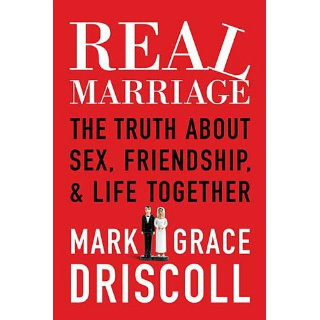 Do you ever wish a pastor would shoot straight about sex? Not the pie-in-the-sky sexual idealism that preachers rant about and many people break by the time they graduate high school. I’m talking real truth about the sexual messes that too many people find themselves in. If so, then this book is for you.
Do you ever wish a pastor would shoot straight about sex? Not the pie-in-the-sky sexual idealism that preachers rant about and many people break by the time they graduate high school. I’m talking real truth about the sexual messes that too many people find themselves in. If so, then this book is for you.
Real Marriage is a somewhat controversial book in Christian circles, not because anything in there is unbiblical, but because Mark Driscoll ventures into sexual issues that some consider taboo. Driscoll doesn’t venture here to be shocking or to make headlines, but because as a pastor he ministers where his people struggle. As a pastor to thousands, he’s encountered numerous stories of heartache and pain associated with sexual episodes. So, this book is him being an incredible pastor: taking the real-life struggles of people and shining the light of Scripture on them, to help them find a way out.
The book itself is broken up into two main sections: marriage and sex. The first section is helpful, looking at men and women in marriage, and marriage as friendship. As a Christian husband, I loved reading this bit of research, “Churchgoing husbands express more positive emotion to their wives, are more attentive to their marriages, serve their wives more, take more time for date night and time together, and invest more in their wives” (58).
The book really starts to steam up (pun intended) with the second section on sex. Here’s the value of the book: Driscoll deals with the raw and messy sexual struggles of real-life Christians today. Teaching at a marriage conference, Mark and Grace Driscoll encountered the brutal reality of what couples struggle with. Here’s what they encountered as people came up to talk with them: “Women who were molested as children, weeping so hard they could not breathe; husbands who had been caught, yet again, viewing porn; a married couple who had not had any sexual contact in more than a decade; a woman who had sex with her husband twice a day and was still unsatisfied, wanting more; a few couples who had been married more than a year and were still virgins; one woman who had not told her husband she had dozens of partners before they met; a wife who asked if her husband was guilty of raping her; and a Christian couple who wanted to know if they should keep watching porn together” (107).
As uncomfortable as it might be, situations like this exist in too many marriages today. Preachers like me get off too easy if we simply stick to the “don’t have sex before you’re married” message. That works if you’re preaching to teenagers, but what about the rest of us? What about those who have already made mistakes? What about those who are still trying to put together the pieces of a broken sexual life? What about those who are scarred from childhood experiences too horrific to recount? What about them?
As a pastor, Driscoll wades into the mess, rolls up his sleeves, and tries to help people find a way out. He and his wife are open about their sexual experiences growing up and how it negatively affected their marriage. Neither of them were virgins when they were married, and Grace was the victim of sexual abuse growing up. Their story is one of redemption and hope as they found healing and wholeness in Jesus. Grace’s willingness to open up about her sexual abuse as a child is invaluable for the millions of girls who suffer abuse growing up. Because of the stigma attached to it, too many girls don’t deal with the pain of it and carry that into their marriage. Grace’s journey points to the reality that sexual abuse does affect sexual intimacy with your spouse, and unless it’s properly dealt with, it will poison your marriage.
Chapter Ten raises the most eyebrows with ultra-conservative Christians, because Driscoll ventures into taboo territory and tries to apply biblical truth to areas that ‘good’ Christians aren’t supposed to talk about. Titled “Can We _____?”, he looks at eleven different categories of sexual reality that couples encounter today, including masturbation, anal sex, oral sex, role-playing, and whole host of other things that Christians want to know about but don’t feel comfortable asking. Because there is no sexual checklist in the Bible, Driscoll applies three scriptural principles to all of the categories and helps couples get scriptural truth applied to their sexual questions. While uncomfortable, this chapter is invaluable to a Christian couple just trying to get some answers to real-life questions. I applaud his bravery for venturing into such a taboo area and treating the issues with dignity and respect.
LESSONS LEARNED
1. Your sexual past has in incredible impact on your marriage. Through page after page of research and real life stories, Driscoll brings to light the convincing reality that sex always has consequences. If engaged in the wrong way, it can be devastating to a marriage.
2. Christian couples deal with sexual issues just like everyone else. Although everyone looks clean and dressed up on Sundays, they deal with sexual issues just like everyone else. I’m incredibly thankful for a book like this that tackles these issues head on.
3. The pain of sexual abuse is real. Grace’s story of abuse and its after effects are too often repeated in society today. My heart breaks for girls who are first victims of abuse, and then victims of shame that prevents them from finding help.
4. There is hope and healing for every sexual issue in Jesus. Greater than the pain of sexual mistakes, the light of Christ shines through this book as Mark and Grace continually point to the wholeness that anyone can find in Jesus.
5. Pastors need to talk about this more. Although many of today’s sexual issues aren’t specifically mentioned in Scripture, there are biblical principles that can bring hope to millions of people struggling with the consequences of sexual sin. We just have to be brave enough to walk towards the mess.















